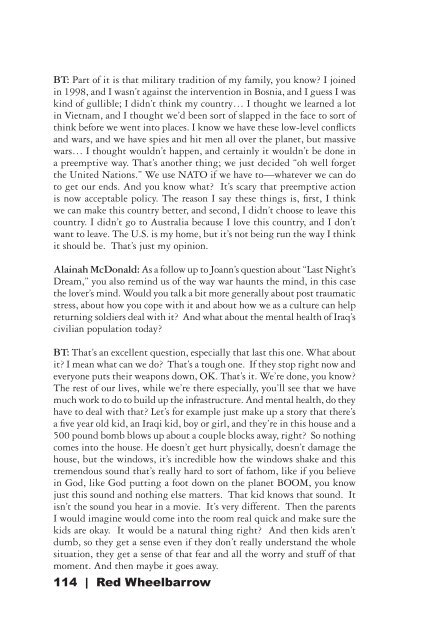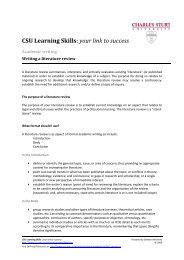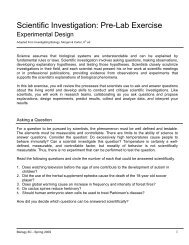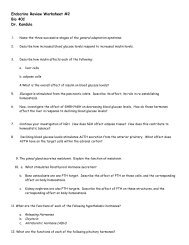Red Wheelbarrow 2008 text FINAL REVISED.indd - De Anza College
Red Wheelbarrow 2008 text FINAL REVISED.indd - De Anza College
Red Wheelbarrow 2008 text FINAL REVISED.indd - De Anza College
You also want an ePaper? Increase the reach of your titles
YUMPU automatically turns print PDFs into web optimized ePapers that Google loves.
BT: Part of it is that military tradition of my family, you know? I joined<br />
in 1998, and I wasn’t against the intervention in Bosnia, and I guess I was<br />
kind of gullible; I didn’t think my country… I thought we learned a lot<br />
in Vietnam, and I thought we’d been sort of slapped in the face to sort of<br />
think before we went into places. I know we have these low-level conflicts<br />
and wars, and we have spies and hit men all over the planet, but massive<br />
wars… I thought wouldn’t happen, and certainly it wouldn’t be done in<br />
a preemptive way. That’s another thing; we just decided “oh well forget<br />
the United Nations.” We use NATO if we have to—whatever we can do<br />
to get our ends. And you know what? It’s scary that preemptive action<br />
is now acceptable policy. The reason I say these things is, first, I think<br />
we can make this country better, and second, I didn’t choose to leave this<br />
country. I didn’t go to Australia because I love this country, and I don’t<br />
want to leave. The U.S. is my home, but it’s not being run the way I think<br />
it should be. That’s just my opinion.<br />
Alainah McDonald: As a follow up to Joann’s question about “Last Night’s<br />
Dream,” you also remind us of the way war haunts the mind, in this case<br />
the lover’s mind. Would you talk a bit more generally about post traumatic<br />
stress, about how you cope with it and about how we as a culture can help<br />
returning soldiers deal with it? And what about the mental health of Iraq’s<br />
civilian population today?<br />
BT: That’s an excellent question, especially that last this one. What about<br />
it? I mean what can we do? That’s a tough one. If they stop right now and<br />
everyone puts their weapons down, OK. That’s it. We’re done, you know?<br />
The rest of our lives, while we’re there especially, you’ll see that we have<br />
much work to do to build up the infrastructure. And mental health, do they<br />
have to deal with that? Let’s for example just make up a story that there’s<br />
a five year old kid, an Iraqi kid, boy or girl, and they’re in this house and a<br />
500 pound bomb blows up about a couple blocks away, right? So nothing<br />
comes into the house. He doesn’t get hurt physically, doesn’t damage the<br />
house, but the windows, it’s incredible how the windows shake and this<br />
tremendous sound that’s really hard to sort of fathom, like if you believe<br />
in God, like God putting a foot down on the planet BOOM, you know<br />
just this sound and nothing else matters. That kid knows that sound. It<br />
isn’t the sound you hear in a movie. It’s very different. Then the parents<br />
I would imagine would come into the room real quick and make sure the<br />
kids are okay. It would be a natural thing right? And then kids aren’t<br />
dumb, so they get a sense even if they don’t really understand the whole<br />
situation, they get a sense of that fear and all the worry and stuff of that<br />
moment. And then maybe it goes away.<br />
114 | <strong>Red</strong> <strong>Wheelbarrow</strong>

















